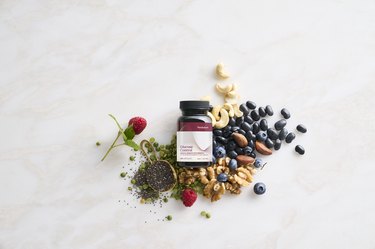For the more than 37 million Americans living with diabetes, diet, exercise and sometimes medication figure prominently in the management of the disease. But did you know that research now suggests probiotic supplements could be added to that list of management tools, too?
A July 2020 clinical trial in BMJ Open Diabetes Research and Care showed the combination of probiotic strains found in Pendulum Glucose Control helped reduce after-meal blood sugar spikes in people with type 2 diabetes who were also on metformin.
Video of the Day
Video of the Day
Translation: Keeping glucose levels steady is critical for people with type 2 diabetes — which inhibits the body from effectively absorbing sugar as a result of insulin resistance — and research indicates the gut microbiome may play a role in supporting those healthy blood sugar levels.
To explore this connection, John S. Eid, PhD and his two co-founders began using new DNA sequencing technology to create metabolic maps of the microbiome. The result was Pendulum Therapeutics, Inc. and its collection of probiotics that are uniquely targeted to offer a wide range of health solutions that are accessible for all.
"The advent of DNA sequencing technology has enabled us to peer deeply into the microscopic world and understand more clearly how essential it is for our own health and wellbeing," says Eid, Pendulum's chief science officer. "Humanity is on the cusp of a great many discoveries that will leverage the wealth of capabilities found in this microscopic realm."
How It Works
Pendulum Glucose Control harnesses several probiotic strains — Akkermansia muciniphila, Clostridium butyricum and Clostridium beijerinckii — that haven't been widely used in supplements because they are anaerobic (meaning they die in the presence of oxygen), which makes them difficult to study.
The strains are found naturally in the deepest parts of the gastrointestinal tract, according to Eid, and they offer a host of benefits. "Akkermansia is associated with a thicker gut lining, which benefits the body by reducing the amount of potentially inflammation-inducing material from getting into your circulation," Eid says, citing a February 2018 study in Experimental & Molecular Medicine conducted on mice.
The Clostridial strains produce butyrate, a short-chain fatty acid that may help protect against diet-induced insulin resistance, according to an April 2012 PLOS One study in mice.
So how exactly do these probiotics support healthy glucose levels? Eid breaks down the process: "Specialized probiotic strains provide specific functions that enable the body to process healthy foods like fiber into postbiotics (health-inducing molecules produced by bacteria) that are crucial in the signaling that enables your body to effectively handle sugar," he says.
Wide-Ranging Health Benefits
Controlling blood sugar is known to have a number of health benefits. According to Eid, "there are general health benefits reported for a variety of the strains in the formulation, as well as reported to us through surveys that indicate reduction in GI issues, improved energy and reduced mental fog."
And, according to the CDC, glucose management is key in helping maintain a healthy heart, eyes, kidneys, and more.
For best results, Eid recommends incorporating Pendulum Glucose Control into your daily vitamin routine, along with a diet rich in soluble fiber like oats, peas and beans, and resistant starch such as whole grains, plantains or green bananas. "This will serve as the fuel for these key strains, since they are the ones that are able to break down fiber and convert it to butyrate and other key postbiotics," Eid says.
Want to try it for yourself? Use code LIVESTRONG for 20 percent off your first month of a Pendulum membership, which gets you free shipping and nutrition services from a microbiome expert.
- BMJ Open Diabetes Research and Care: "Improvements to postprandial glucose control in subjects with type 2 diabetes: a multicenter, double blind, randomized placebo-controlled trial of a novel probiotic formulation"
- Exp Mol Med: "Akkermansia muciniphila-derived extracellular vesicles influence gut permeability through the regulation of tight junctions"
- PLOS One: "Butyrate and propionate protect against diet-induced obesity and regulate gut hormones via free fatty acid receptor 3-independent mechanisms"
Was this article helpful?
150 Characters Max
0/150
Thank you for sharing!
Thank you for your feedback!

